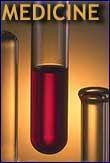
Scientists are tweaking naturally occurring body proteins to create customized molecules that can seek out and deliver drugs to cancer cells.
The research, which is still in the very early stages and has not advanced to human clinical trials yet, could one day lead to new types of cancer drugs capable of avoiding rejection by the body's immune system and which leave normal cells unharmed.
One of the drug transport vehicles is made using modified versions of low- and high-density lipoproteins—LDL and HDL, respectively—the molecules that transport fat and cholesterol around the body. The lipoproteins are modified to carry payloads of cancer drugs such as taxol, or light-sensitive agents that release toxic chemicals only when exposed to specific wavelengths of light.
By using molecules the body is already familiar with, therapy could be custom tailored to specific kinds of cancer, said research team-member Jerry Glickson of the University of Pennsylvania. Not all cells in the body are equally receptive to some proteins. Whether a protein gains entrance into a particular cell depends on whether the cell's outer surface contains receptors sensitive to that protein.
"With the LDL particles, we get a lot of deposition in the liver and abdomen, whereas you get much less with HDL, so that's going to affect where you're going to send these things," Glickson told LiveScience.
The researchers are also working to attach metal ions that can be easily detected by MRI or other imaging technologies to glucose, an important sugar molecule that provides energy for the body's cells.
A third class of agents the researchers are working on is called "molecular beacons." These beacons light up, or "fluoresce," when they come into contact with specific molecules produced by cancer cells. Other scientists have created probes that work in similar ways. One team incorporated live bacteria into self-piloting "nanoshuttles" capable of delivering drugs to specific cells in the body by targeting specific proteins on those cells. Another team at Purdue University has created nano-sized gold particles that fluoresce from within the body when exposed to near-infrared light.
Sign up for the Live Science daily newsletter now
Get the world’s most fascinating discoveries delivered straight to your inbox.
One class of beacons in the new research responds specifically to genetic messengers molecules called mRNA. Another beacon activates only when it comes into contact with proteins produced by cancer cells undergoing programmed cell death, or "apoptosis." One beacon the researchers are working on can even trigger apoptosis when activated.
The research will be presented at a meeting for the American Association of Physicists in Medicine in August.
- Top 10 Mysterious Diseases
- Cancer Takes Over Top Spot as Killer of Americans Under 85
- Gold Probes Could Reveal Cancer in Your Body
- The Odds of Dying
